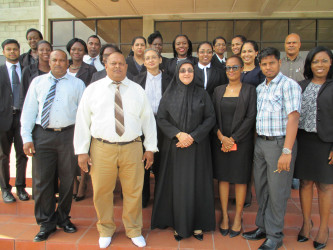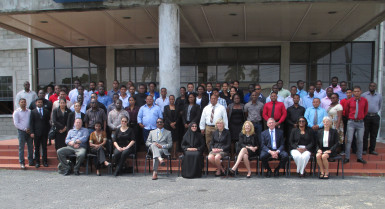Against the backdrop of a noticeable increase in crimes and continued concerns at the many shortfalls in the court system, 75 police officers and state prosecutors have begun training under a Canadian-funded project intended to improve conviction rates.
Four training programmes are presently underway under the ‘Strengthening the Criminal Justice System in Guyana’ project, which is being implemented over the next two years by Canadian non-governmental organisation the Justice Education Society (JES) at a cost of Cdn$750,000 ($106 million).
The project, which is Canada’s largest bilateral project with Guyana, is being funded by the Government of Canada through its Anti-Crime Capacity Building Program (ACCBP). It will end in May, 2017, when it is hoped at least 250 persons attached to Guyana’s justice system would have benefited from training.

It is intended to develop the technical capacity of the police, police prosecutors, state prosecutors and magistrates to collect, analyse and present forensic evidence. Towards this end, the ongoing training programmes are focused on major case management, forensic video analysis and crime scene management.
Speaking with reporters yesterday at the Police Training Centre at Camp Street, where the programmes are being conducted, Attorney General Basil Williams said the forensic video analysis programme is by far the most important as it would provide police investigators with the ability to interpret images captured by CCTV cameras. Although the increased use of surveillance cameras has made more footage available to local law enforcement authorities, the use of such evidence has been minimal in the prosecution of crimes.
Williams noted that magistrates are being trained to understand the investigation process and the evidence and decide what way it should best be presented to the court. He said too that prosecutors must know to handle the evidence collected by the crime scene investigators, as well as the quality of the evidence that they would have to lay before the magistrates and even the judge and jury.

Williams explained that the training comes at a very opportune time.
“We have serious crime problems in Guyana and we are beset with crime and this government’s intention is to ensure that we reduce crime to a very significant extent if not eliminate,” he said.
“Our government has undertaken to restore the rule of law, to deliver a justice system that is impartial, accessible and accountable and to ensure that crime is solved more quickly and efficiently,” he added.
Williams noted that in this regard government is pleased to partner with the JES in ensuring that the capacity to solve crime is enhanced by training police prosecutors, crime scene investigators, state prosecutors, magistrates and forensic experts. “Together, with this common objective, I am sure we can do much to help the government in giving the protection the people need and in ensuring their safety and security. With the initiatives that we will hopefully create, and the programmes we will come up with through this activity, we shall likewise be able to contribute in preventing crime and building a society where peace and order reign,” he said.
Meanwhile, Charge d’Affaires of the Canadian High Commission Sharmini Poulin noted that the training provided to the police and state prosecutors will strengthen evidence-based investigations. She added that it is hoped that the knowledge gained will be shared and ultimately continue to raise the standards and efficacy of the criminal justice system.
Poulin said that the project is a part of Canada’s commitment to promoting freedom, democracy, human rights and the rule of law by strengthening the professionalism and accountability of law enforcement agencies.
“Our capacity building efforts in Guyana and elsewhere are helping criminal justice systems to be more responsive to the needs of citizens. For instance, we have also supported a successful Justice Education System programme in El Salvador, which has resulted in in tangible, positive results in terms of increased efficiency of criminal investigations, greater collaboration between institutions and reduced impunity rates,” she pointed out.
According to Poulin, access to a competent and fair justice system is a fundamental human right. In an effective criminal justice system, all parties involved must have a common understanding on decisions pertaining to the management, policies and procedures throughout the whole system, she said, while adding that this is the underlying premise of the training which has been and will continue to be delivered to the different areas within the local justice system.
The JES project, Poulin said, complements work already being done locally to strengthen court procedure rules and improve access to and efficiency of the justice system. Although JES works and has worked in different corners of the world, its work does not follow a “one size fits all” model, Poulin said, while adding that while the methodology is based on Canadian best practices, it is always modified and tailored to local and social contexts. Work is done in full collaboration with local partners from project inception to completion, she assured.
Apart from the Ministry of Legal Affairs, she listed the local partners as the Ministry of Public Security, the Guyana Police Force, the Office of the Director of Public Prosecutions (DPP), and the Office of the Chancellor of the Judiciary.
JES, which was established in 1989, works to build stronger communities by promoting understanding of, access to, and confidence in justice systems both in Canada and abroad.





